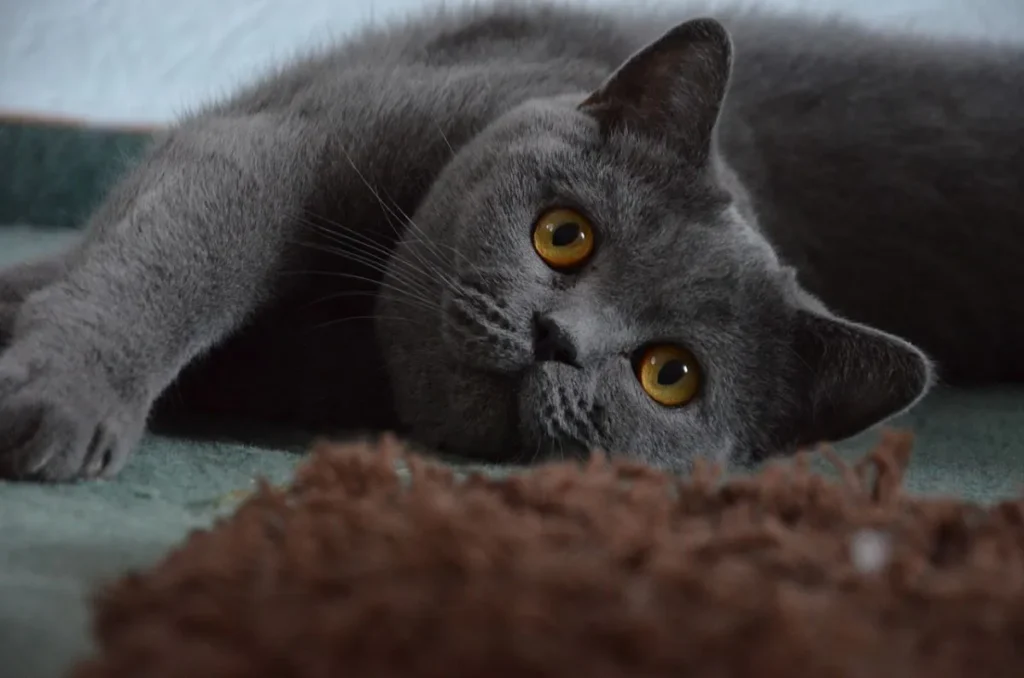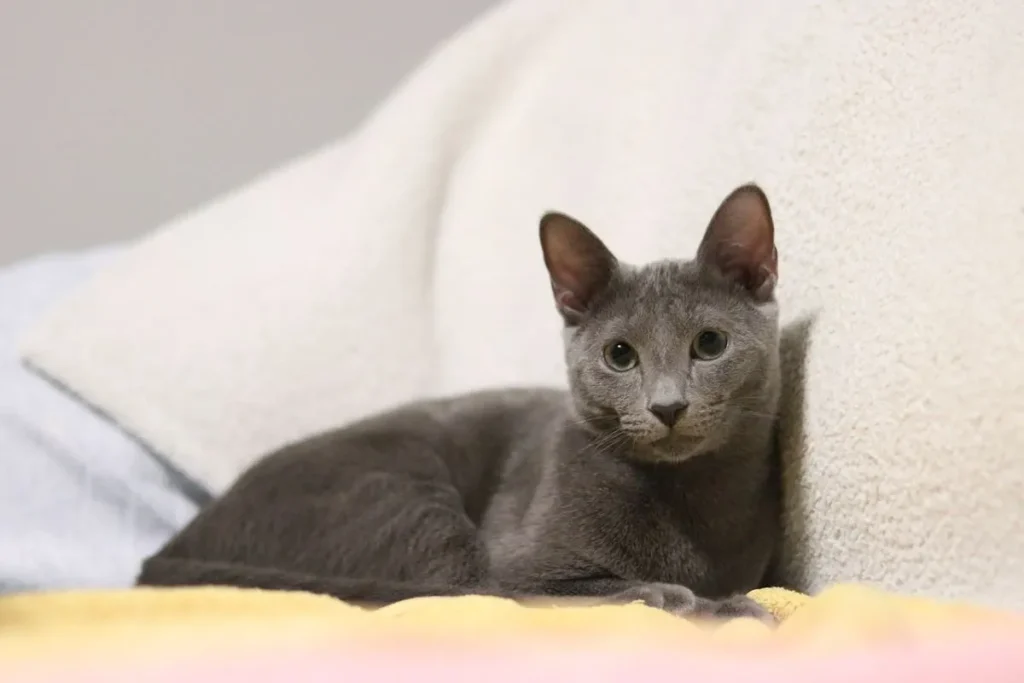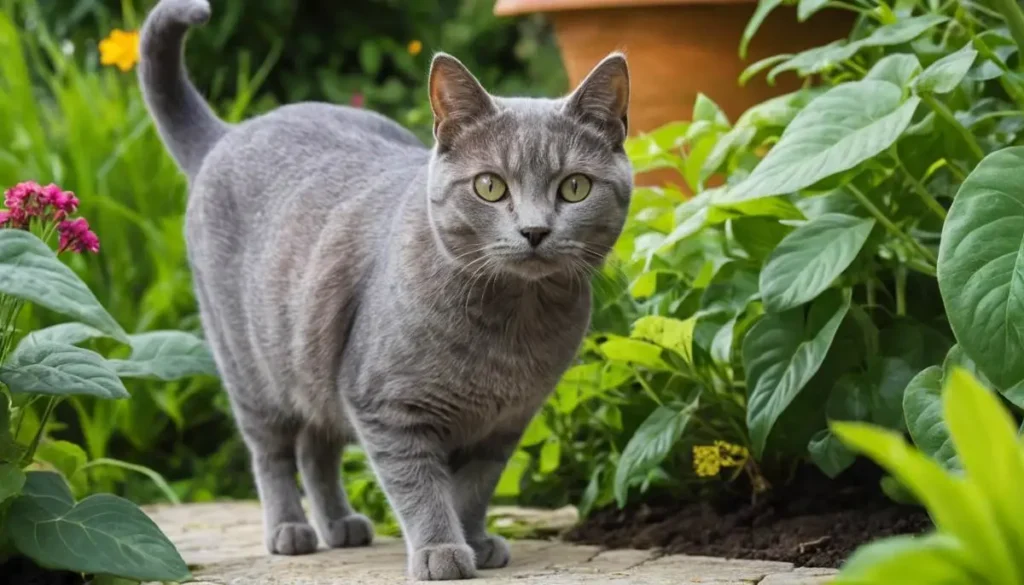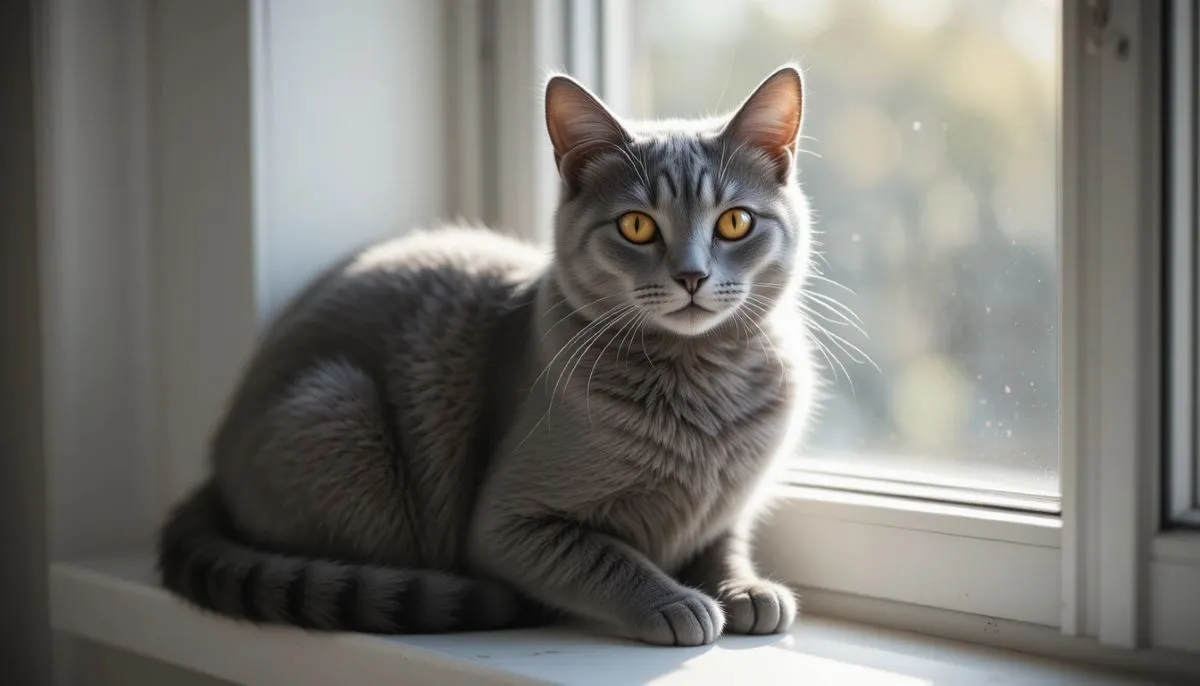Introduction
Grey cats have long been admired for their stunning coats and calm, mysterious demeanor. Whether you’re already a proud owner or considering adopting one, understanding the unique Grey Cat personality can help you foster a stronger bond with your feline friend. From their affectionate nature to their curious and intelligent behavior, grey cats are known for traits that make them exceptional companions. In this guide, we’ll explore seven fascinating traits of grey cats, along with essential care tips and interesting facts about their behavior. Ready to learn more about what makes grey cats so special? Let’s dive in!
Table of Contents
What Makes a Grey Cat Unique?

Grey Cat’s Coat Colors and Genetics
The beautiful coat of a grey cat is the result of specific genetic traits. The grey color comes from a diluted form of the black gene, which creates a soft, silvery appearance. This genetic variation is common across different breeds, including Russian Blues, British Shorthairs, and Chartreux. The diversity in shades—from light silver to deep charcoal—adds to the cat’s distinctiveness and charm.
Distinct Grey Cat Eye Colors
Grey cats often have striking eye colors, ranging from bright green to deep amber or golden hues. The contrast between their vivid eyes and their soft grey fur makes them incredibly captivating. Interestingly, eye color in grey cats is influenced by melanin levels, with lower melanin resulting in lighter-colored eyes.
Grey Cat Personality Traits
Many cat owners report that grey cats are gentle, affectionate, and highly social. While every cat has a unique temperament, grey cats are often described as calm, intelligent, and playful. These personality traits, combined with their serene appearance, make them popular pets among families and single owners alike.
Popular Grey Cat Breeds
Grey cats can belong to various breeds, each with its own unique characteristics. Several well-known grey cat breeds are:
- Russian Blue: Known for its dense double coat and vibrant green eyes.
- Chartreux: A rare French breed with a plush grey coat and golden eyes.
- British Shorthair: stands out with its chubby cheeks and luxuriously thick fur.
Each breed brings something special to the table, but they all share the enchanting grey coat that cat lovers adore.

Grey Cat Personality Traits
Affectionate and Loyal Nature
Grey cats are often recognized for their affectionate personalities. They tend to form strong bonds with their owners, following them around the house and seeking attention. While they might not be as vocal as some other breeds, they express loyalty through gentle purring and consistent companionship. Grey cats are known to enjoy being petted and will often curl up beside you for warmth and comfort.
Calm and Gentle Temperament
Compared to more energetic or aggressive cats, grey cats tend to have a calm and gentle demeanor. They are ideal for families with children or elderly individuals because they exhibit patience and rarely show signs of irritability. This even-tempered nature makes grey cats great therapy pets, offering comfort and emotional support to their owners.
Curiosity and Intelligence
Grey cats are naturally curious creatures. They love to explore new environments, climb on furniture, and investigate unfamiliar objects. Their intelligence makes them quick learners, allowing them to be trained for simple tasks like using a scratching post or responding to their name. Providing interactive toys and puzzles can help stimulate their minds and keep them entertained.
Playfulness and Energy Levels
While grey cats are generally calm, they also have a playful side. They enjoy interactive play sessions with toys, laser pointers, or feather wands. Regular playtime is essential for keeping their energy levels balanced and preventing boredom. Even as they age, grey cats maintain a youthful spirit, making them delightful companions throughout their lives.
How to Care for a Grey Cat
Feeding and Nutrition for a Grey Cat
Proper nutrition plays a vital role in maintaining the health and longevity of your grey cat. Ensure they receive a balanced diet rich in high-quality protein, essential vitamins, and minerals. Consult your veterinarian to determine the best type of food for your cat’s age, activity level, and any special health needs. Always provide fresh water and avoid feeding them harmful human foods such as chocolate, onions, or grapes.
Grooming and Coat Maintenance
Grey cats, regardless of their breed, require regular grooming to keep their coats clean and healthy. Short-haired grey cats benefit from weekly brushing to remove loose hair and minimize shedding. Long-haired varieties typically require daily brushing to avoid knots and tangles. Using a soft-bristled brush or grooming glove helps keep the coat shiny and reduces hairballs. Regular nail trimming and ear cleaning are also important aspects of grooming.
Exercise and Mental Stimulation
Keeping a grey cat physically and mentally stimulated is crucial for their overall well-being. Provide interactive toys, scratching posts, and climbing trees to encourage exercise. Puzzle feeders and treat-dispensing toys can keep them mentally engaged. Regular play sessions help maintain a healthy weight and strengthen your bond with your cat. If your grey cat enjoys outdoor exploration, ensure they do so safely in a secure, enclosed space.
Routine Health Checkups
Regular visits to the veterinarian are crucial for spotting potential health concerns early. Ensure your grey cat is up to date with vaccinations, flea and tick treatments, and deworming. Schedule annual dental cleanings and monitor their behavior for any changes that might indicate illness. Early intervention can significantly improve your cat’s quality of life.
Creating a Comfortable Living Environment
Grey cats thrive in a calm, safe, and clean environment. Ensure they have a quiet space to retreat to when they need rest or solitude. Provide a cozy bed, litter box in a private area, and access to natural sunlight. Maintaining a consistent routine helps reduce stress, making your grey cat feel more secure.
Grey Cat Health Considerations
Common Health Issues in Grey Cats
Like any other cats, grey cats are susceptible to certain health problems, though their color does not directly influence their health. Common issues include dental diseases, heart conditions, and obesity. While no breed or coat color guarantees immunity, keeping up with routine vet visits and a healthy diet can help manage and prevent some of these conditions. Grey cats can also be prone to urinary tract infections (UTIs), especially if they are not drinking enough water, so always ensure fresh water is available.
Genetic Predispositions and Breed-Specific Health Risks
If your grey cat belongs to a specific breed, such as the Russian Blue or British Shorthair, be aware of the genetic predispositions associated with these breeds. For example, Russian Blue cats are more likely to develop kidney disease or heart issues, while British Shorthairs can have a higher chance of developing hip dysplasia or obesity. Understanding your cat’s breed-specific risks can help you take preventive measures and seek early treatment if needed.
Regular Veterinary Checkups for Preventive Care
Routine veterinary visits are crucial for all cats, including grey cats, to ensure their health is monitored and potential issues are caught early. Regular health checkups often include physical exams, vaccinations, blood work, and dental checkups. Keeping an eye on their weight, behavior, and general health will help identify problems early, preventing them from escalating. A proactive approach will ensure your grey cat enjoys a long, healthy life.
Weight Management and Obesity Prevention
Obesity is a growing concern among cats, including grey cats. Maintaining an optimal weight is important for their overall health, as excess weight can lead to conditions such as diabetes, arthritis, and heart disease. Feeding your cat the correct portion sizes, ensuring they get enough exercise, and avoiding overfeeding treats are key to weight management. Keep an eye on your cat’s body condition to ensure they remain in a healthy weight range.
Dealing with Aging Grey Cats
As grey cats age, they may face common aging issues, such as arthritis, dental disease, or cognitive dysfunction. Older cats tend to be more sensitive to temperature changes and may require additional care, such as soft bedding, gentle play, and easy access to food and water. Regular vet checkups for senior cats are especially important to manage aging-related health problems and maintain their comfort and quality of life. Keep an eye out for signs of arthritis or decreased mobility and seek guidance from your vet on how to support your senior cat.

FAQs About Grey Cats
Are Grey Cats Friendly and Social?
Grey cats, like other cats, have varying personalities depending on their breed, upbringing, and environment. However, many grey cats, particularly breeds like the Russian Blue and British Shorthair, are known for their calm and affectionate nature. They tend to form strong bonds with their human families and may enjoy spending time with them. While some might be more independent, many grey cats are friendly and social, often seeking affection or playtime. Their gentle temperament makes them great companions, especially in households with children or other pets.
What Is the Lifespan of a Grey Cat?
The lifespan of a grey cat largely depends on its breed, genetics, diet, and overall health. On average, a healthy domestic cat, regardless of coat color, can live anywhere from 12 to 16 years, with some reaching even into their 20s. Grey cats from specific breeds may have slightly different life expectancies, with Russian Blue cats, for example, often living up to 15-20 years. Ensuring your grey cat receives proper nutrition, regular veterinary care, and a healthy environment can help extend their life.
Do Grey Cats Require Special Grooming?
Grey cats generally do not require special grooming beyond the usual care. How much grooming a cat needs depends on the type and length of its coat. Long-haired grey cats, like the Russian Blue or Nebelung, may require more frequent brushing to prevent matting and hairballs. Short-haired grey cats, on the other hand, usually need minimal grooming, but regular brushing can still help reduce shedding and maintain a healthy coat. All cats, including grey ones, should also have their nails trimmed, ears checked, and teeth cleaned as part of a regular grooming routine.
What Are the Most Common Health Issues in Grey Cats?
Grey cats are not inherently predisposed to any specific health issues based solely on their coat color. However, certain breeds of grey cats may be more prone to genetic health problems. For instance, Russian Blue cats are prone to kidney disease, while British Shorthairs may experience obesity or heart issues. Regular vet checkups and a healthy lifestyle, including proper diet and exercise, are essential for preventing health problems in grey cats. Early detection through routine exams can help address issues before they become serious.
Are Grey Cats Hypoallergenic?
While no cat is truly hypoallergenic, some people find that certain cats, including grey ones, may cause fewer allergy symptoms. This is often due to the individual cat’s level of protein production in their saliva, which is the primary trigger for allergies. Russian Blue cats, for example, are often said to produce less of the allergenic protein Fel d 1, which may make them a better choice for people with mild cat allergies. However, if you have severe allergies, it’s essential to consult with a doctor and spend time with the cat before adopting.
How Can I Tell if My Grey Cat Is Healthy?
A healthy grey cat, like any cat, will have clear, bright eyes, a shiny coat, and an active demeanor. You should also monitor their eating habits, weight, and behavior for any significant changes. If your cat experiences a sudden decrease in appetite, fatigue, or weight loss, it may signal a health issue that requires professional care. Regular checkups, along with a balanced diet and regular play, will help keep your grey cat in top health. Pay attention to any signs of discomfort, like limping or difficulty jumping, as these could signal health issues like arthritis.
Conclusion
Grey cats are not just stunning in appearance but also possess fascinating personalities and qualities that make them wonderful companions. From their calm and affectionate nature to their distinct traits, grey cats can be incredibly loyal and loving pets. Their personality varies depending on the breed, but with proper care and attention, they make great additions to any family.
By understanding the specific needs of a grey cat, such as regular grooming, health monitoring, and a balanced diet, you can ensure they live a long and happy life. Whether you’re a first-time cat owner or already have experience with cats, knowing how to care for a grey cat’s health, emotional needs, and grooming will help you foster a deeper bond with your feline friend.
Ultimately, the joy and companionship a grey cat offers are well worth the effort, and with the right care, they will continue to bring happiness to your home for many years.

